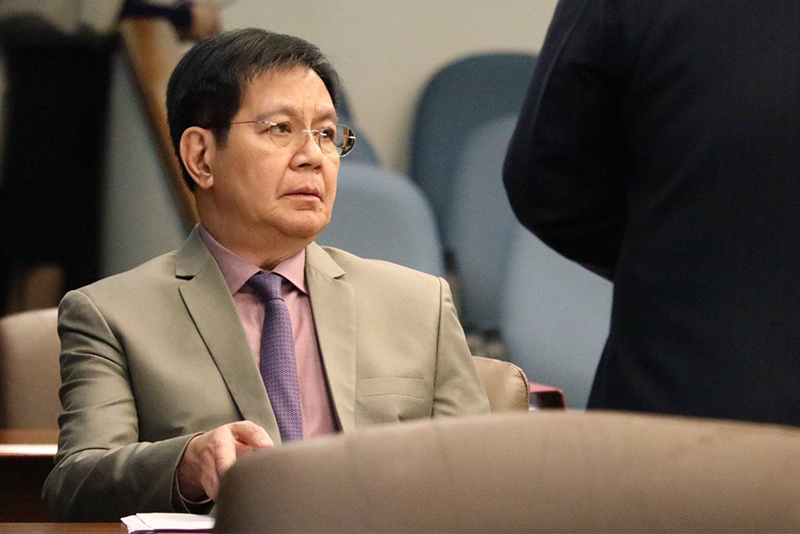Lawmakers urged: Give up ‘pork’ to fund free tuition

Funding the free college education law that President Duterte signed last week will not be a problem if the government taps unused appropriations and lawmakers give up their pork barrel in the 2018 national budget, Sen. Panfilo Lacson said yesterday. Panfilo Lacson/Released, File
MANILA, Philippines - Funding the free college education law that President Duterte signed last week will not be a problem if the government taps unused appropriations and lawmakers give up their pork barrel in the 2018 national budget, Sen. Panfilo Lacson said yesterday.
Lacson, vice chairman of the Senate committee on finance, made the statement as the House of Representatives started deliberations on the proposed P3.7-trillion national budget for 2018 with lawmakers from both sides vowing to find funds for Republic Act 10931 or the Universal Access to Quality Tertiary Education Act.
The new law, which mandates free education in state universities and colleges (SUCs), local universities and colleges (LUCs), and state-run technical and vocational (tech-voc) schools to qualified students, is estimated to cost around P25 billion to P30 billion a year.
The law did not explicitly provide for appropriations to allow the government flexibility in allocating specific amounts every fiscal year.
“My hope is that the pork of congressmen and senators be removed and be allocated for the budget of free (college) education,” Lacson told dzBB.
He said that while everyone in Congress agrees to find funding in the proposed 2018 budget for the landmark law, he worries that budgets of other agencies that urgently need funds would be cut.
The senator recalled that while the Senate was able to realign some P8.3 billion from alleged pork barrel allocations in some congressional districts in Mindanao in this year’s budget, the same questionable appropriations were restored through cuts in various provisions, including the calamity fund, from P37 billion to P22 billion.
“We don’t want that to happen again for 2018,” Lacson said, referring to the restoration of questionable allocations.
The senator expressed belief that several of his colleagues in the chamber might have gotten some pork allocations this year amounting to P300 million each through projects in various government agencies.
Lacson, however, said Senate Majority Leader Vicente Sotto III, like he, “waived” his pork barrel projects.
Unused 2017 funds
Lacson said another possible source of funding for the law are the unused funds in this year’s national budget estimated so far at P422 billion but there could be some legal issues in the move owing to the classification of such funds.
He said that agencies, like the National Irrigation Administration, Departments of Public Works and Highways, Agriculture and Education, whose spending capability have always been below expectations, can expect their proposed budgets to be slashed in favor of free college education and other vital programs.
Meanwhile, Albay Rep. Edcel Lagman believes affluent families whose children passed the entrance exams for state universities and colleges should have enough conscience to pay for their tuition and give more way to poor yet deserving students to avail themselves of the government’s free tertiary education.
“Students who come from families who could afford to pay tuition must be encouraged to opt out in order to reduce the total amount needed (for government to allocate funds to SUCs),” Lagman proposed.
No less than Davao City Rep. Karlo Alexei Nograles, chairman of the House committee on appropriations, gave assurance that his committee will “allot the necessary funding to finance the Universal Access to Quality Tertiary Education Act.”
“Education is a great equalizer. It gives the poor the opportunity to change (their) way of life. We have already reviewed the possible financial implications and complications. I can safely say that there is enough money to jumpstart this and sustain it in the long term,” he said.
Cavite Rep. Strike Revilla, a co-author of the law, described it as a “big step toward reforming the educational system in the country by giving chance to the poor but deserving students to finish their college degree.”
Praised
Meanwhile, the Student Council Alliance of the Philippines (SCAP) praised the enactment of the Universal Access to Quality Tertiary Education Act, but strongly hoped that the law is not to absolve Duterte from all his liabilities.
“The law affirms that education is a right by freeing students from expensive tuition and other fees,” SCAP stated in a Facebook post.
“Duterte’s signature on the free education law does not, however, absolve him of accountabilities on the human rights violations under his administration.”
SCAP national chairperson Khryzza Mae Pinzon said the law is important for it is just for the government to invest in the youth. – With Delon Porcalla, Kurt Adrian dela Peña, Artemio Dumlao
- Latest
- Trending

























